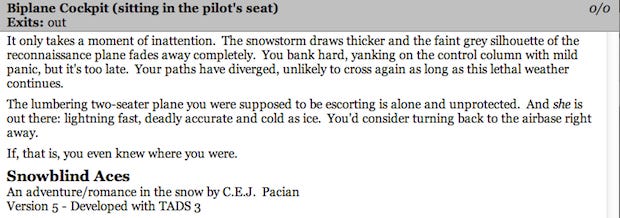S.EXE: Snowblind Aces
wordy rub 'n' tug
Ah, mes cheries. This week's S.EXE is a romantic tale of two hot-shots in a clinch. It's hard to find well-written romance in games, but it's also hard to find dialogue that's naturalistic or flowing... Unless you go to the tenderly-kept gardens of the Interactive Fiction forums, where, somewhat ignored by Gamers At Large, the wordsmiths of choice and nuance solder their delicate meanings together, folding out words, opening up new landscapes purely constructed with the master knowledge of parser instructions or hypertext. So today we're heading that way to the lovely little romance game Snowblind Aces, a short, replayable adventure in the vein of the Saturday afternoon matinee movie. It stays on just the right side of Indiana Jones cheesiness. It's parser-based, so get ready to type GET YE FLASKE a lot, or MAKE LOVE TO BEYOOTIFUL WUMAN, and have the game stubbornly refuse to laugh. (Not really: this game is as straightforward as interactive fiction gets.) (Come the heck on!)
C.E.J Pacian made Snowblind Aces for the TIGSource Text the Halls competition. You can download all the files you need to run it (interpreter and game file) here for free. If you'd prefer to play it before reading about it, hey, now's your chance you young spoiler-terrified scallywags. Off you go.
Here's the thing about Interactive Fiction: like literature it functions on the mysterious power of language and its ability to evoke strong imagery in the mind, but also combines that with the manipulation of your own need to play 'investigator'. Interactive fiction is about the uncovering of information by negotiating designer-made gateways - something that fellow game romanceer Christine Love also knows very well. Every foray, for me at least, into the little parser depths of an IF masterpiece, has me feel like I have donned a ruffled dirty black raincoat to shoulder, like Rick Deckard, through words and phrases and, flustered, interrogate the game's printed soul. There's a real sense of cyberpunk for me in every parser game: the idea that I might be 'hacking' into something with the old-school trigger of a command line. It feels sexy to type an instruction and have a game understand, delightful to even have it respond with an error message. It feels romantic for me, in the sentimental way, perhaps because my very first game was Acheton on the BBC Micro. Acheton made me want to read, and, I guess further down the line, it made me want to write too.
In most Interactive Fiction the reward is the pleasure of unpacking a story from the choices the writer provided for you. Your job is to navigate the streets of story without dying, without messing things up, without getting stuck and out of ideas. You are the dogged gumshoe being held in the safe hands of a writer who knows they want you to see hell before you see the end. But it also tests your abilities of interpretation. You must understand what verbs you can use, what it means for you when you possess items or come across scenery or objects. In particular, if you come across another person, you must learn to read the cues in their conversation: conversation in interactive fiction comes hard and fast and it can tip you off to how you will negotiate your environment.
IF is uniquely placed to express romance, more than games that primarily express things through the so called 'graphics'. Flirting is based in language.
Ah yes, the conversational tango. The lexicographical gymnastics meet. The vocabulary-based improvisational jazz ensemble. The wordy rub 'n' tug.
Snowblind Aces is about two people, The Scarlet Baroness and the young man we roleplay called Lucas Thane, who know of each other through reputation. They are both ace fighter pilots on the opposite sides of a vaguely steampunk track. They have danced around each other, they have both been close to death at the other's hand. This story is definitely the heteronormative dream: two equals, a man and a woman, who are, heh, 'top of their field', and who are uniquely suited to banging each other's brains out on their first meeting.
Rumours are printed in the papers that they are in love; they've been romanticised over and over as they attempt to off each other in the skies. But they've been putting that off - their dogfights mean they have almost killed each other several times, and the Scarlet Baroness has even flown out of the sun to get a clear shot at our man Lucas. A shot that we learn she did not take.
When you begin the game you know nothing of this: you just know you are trailing her, whoever she may be, through the mist, until you try to get too close to her plane and smash into her, sending you both to the ground in the snow. There's real writerly skill in the opening paragraphs: the sense of urgency, the immediate sense that you are now lost in the clouds. You can almost hear the hum of your plane's engine. That opening sentence: 'It only takes a moment of inattention'.
Part of the reason that I find this piece of IF so satisfying is that it has a very direct attitude toward everything: it's the IF version of the part in Raiders of the Lost Ark where Indy just shoots the guy. Most actions that you can take in this game are things like 'push column' to steer the plane, 'shoot icekin' to off the beast that rumbles toward you in the forest where you land, 'kiss Imelda'. It makes you feel very much like you are an action hero in the Jones vein. You think it, y'do it. Most interactive fiction at least requires you to interpret your environment more, and often solve puzzles to do with resources or clues. Here, the point is the flirting. The getting to know your enemy. That part in Temple of Doom where Willie and Indy bicker over who is coming to who's room.
There's act one, where you are in the plane, act two, where you are on the forest floor, and act three, where you are sheltering from the cold in the crashed biplane with your mortal enemy, The Scarlet Baroness. The first two acts are the 'action' acts, in which you quickly negotiate physical problems, but the third is a flirtfest. It's almost a delicate process of asking the Baroness who she is, incorporating verbal one-ups into fragments of her memories of your battles, asking her if she remembers your first tangle in the air. Much is revealed about your relationship, your planes, your factions, how she lost her eye.
One interesting touch is that the game is reluctant to let you kiss the Baroness until you are sure that she consents. Most movie action heroes will do that thing where they are about to go out to die, and the heroine with whom they have had romantic tension with throughout gets grabbed and kissed before the dramatic denouement. This game is aware that such a thing is a violent act, but it's also used as a game mechanic: it's necessary to flirt with the Baroness to ascertain her opinion of you before you can kiss her. 'Consent' is interestingly explored: to negotiate the kiss that you want, you have to ask her enough about herself to open up the option to ask her how she feels about you. And even then, you have to make the decision as to whether to tell her that you are in love with her, or whether you should tell her that you feel that you are good friends. If you choose the 'love' option, she will let you kiss her. If you choose the 'friends' option, any attempt to kiss her will result in the game printing that kissing now 'seems somehow inappropriate'. When I worked this out, I nodded approvingly: there's a nice message there. There's no romance without communication; there's no physical relationship without a verbal agreement.
There are a number of options for you to resolve the game, depending on your choice to be friends or not be friends: you can go north with her, ask her to come south with you, both with some risk (they are opposite sides of a faction), or you can go your separate ways. You can also try and shoot yourself or her if you're feeling hopeless. Depending on your choices about the future, the story will play out in various ways, some ending in a pleasant heterosexual fairytale, some in a platonic one.
There's a lovely, gentle sense of longing throughout all of this game. Although it's a cliche situation clearly built on old adventure tropes, the writing is very sure and the flirting is bubbly and knowing. It's got some pacing problems: the first two acts seem too short, and the endings seems to come too quickly, but the experience of revealing information about another person, and idly passing time by a fire in a whiteout by flirting with another warm, frisky, beautiful human being, is the kind of pleasant experience that isn't often indulged by games.
Lovely.
I give this game twenty S.EXEs out of eleventy. See you in two more weeks.











